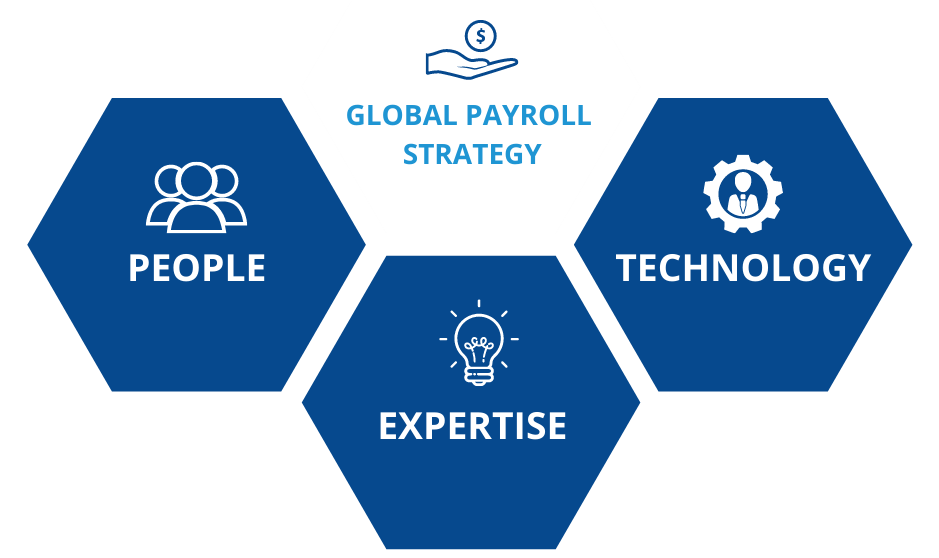2020 has not only made companies realise that digitalisation has long been neglected by many, but also that employees do not necessarily have to be on site 24/7. Business continuity is ensured even if employees do not have a face-to-face meeting every day. Therefore, many companies have seized the opportunity & started hiring employees across the globe. However, without a strategy and taking into account country specifics, this opportunity can turn into a disaster if not executed well.
The Importance of a Global Payroll Strategy
Remote work is here to stay & opens up many opportunities for companies to expand while reducing costs in uncertain times. This accelerated globalisation in a year when it seemed to have stalled. Companies can choose from a larger talent pool and are not limited to city or country borders. However, these newfound opportunities also present various challenges for HR teams, especially when it comes to the very complex payroll process.
Each country has its own regulations and restrictions, and not having the necessary expertise leads to a lack of compliance with labour laws. Extensive research and consideration of potential global payroll challenges are necessary to excel in the long run. Since a key factor in employee well-being and satisfaction is regular pay, implementing a global payroll strategy should be one of your priorities.
The 3 Main Pillars of a Successful Global Payroll Strategy
A successful global payroll strategy is built on three main pillars. The people you want to employ, the IT infrastructure and the expertise that exists within your organisation. A clear overview of each of these pillars and how they impact global payroll processes will help you make the right changes to be successful.
People
Payroll is about making sure your employees are paid on time while complying with government regulations and laws. If you have employees in multiple countries around the world, it becomes even more complex than that. It is important to note that each country may have different rules depending on the positions you are looking to fill, the salary you are paying, mandatory benefits you need to consider, as well as other unique laws that will affect your decision-making process moving forward. To start, you need to understand who you want to hire, where and when you want to hire talent, and in which country.
| WHO | WHERE | WHEN |
|
|
|
Technology
Technology plays a key role in any cross-country workflow – especially in payroll. A manual process where approvals and releases have to be processed and signed by hand is impossible to manage without creating a bottleneck. With employees scattered around the world, it is critical to set up a digital workflow. This needs to be clarified before hiring new talent to ensure an excellent employee experience and well-being from the start.
Considering future strategic changes and scaling, the technology used must be able to grow with your business to avoid additional workload in the future. Make sure you have this space available as well as a great communication system. A cloud solution is a great option as it allows the HR team to automate the process while employees can access important information they need.
Questions to ask:
- How do you want to manage the payroll process?
- Can the current payroll software handle other countries`payroll?
- Are there any manual processes that may cause bottlenecks in the future?
- Is the IT infrastructure in line with plans to scale the business?
Expertise
Payroll is complex and expanding into a new country brings many challenges and risks, especially in terms of compliance. Utilizing payroll professionals in a country other than the one in which you are hiring, can also bring difficulties. Before hiring, consideration must be given to whether your current payroll team or a new in-country expert should handle payroll. In most cases, it is more resource efficient to have an in-country expert who has years of experience with local laws and requirements. A local payroll provider can be a resource-efficient option, especially if only a small number of employees are hired.
Questions to ask:
- Does the current payroll team have the country-specific expertise?
- Does the payroll team have free capacity to handle global employees?
- Is it more cost-efficient to hire a in-country expert?
- Has a global payroll provider be considered for all countries?
Considering the 3 pillars will definitely set you up for success with global payroll management. Novative can support you in setting up streamlined payroll processes in various countries:
| Switzerland | Austria | Netherlands | Spain | Tunisia | USA |
| Germany | Belgium | Italy | Denmark | Morocco | Russia |
| France | UK | Poland | Norway | Dubai | … |
Contact us & we support you in keeping employee satisfaction high by keeping payroll compliant & on time.












This is some agreeable stuff. It took me a while to find this internet site but it was worth the time. I noticed this content was buried in yahoo and not the first spot. This site has a ton of helpful material and it doesnt deserve to be burried in the searches like that. By the way I am going to add this site to my favorites.
I visited many web pages but the audio feature for audio songs current at this website is in fact excellent.